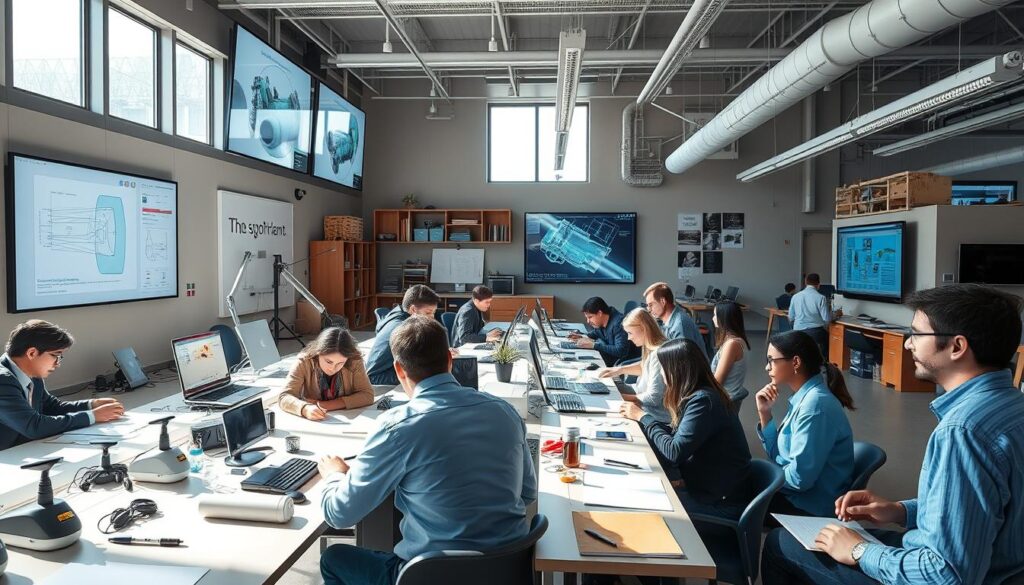Did you know engineers must earn Continuing Professional Development (CPD) credits to keep their licenses? Most state boards require at least 30 PDHs every two years. These courses are crucial for engineers to stay up-to-date in their field.
They help engineers meet licensing needs and learn new tools and knowledge. Professional development courses for engineers is key for career growth.
The engineering world is always changing because of new technology and trends. So, there’s a growing need for training programs that focus on lifelong learning. By taking these courses, engineers can improve their skills and stay ahead in the job market.
There are many ways for engineers to learn, from online courses to in-depth training programs. Continuing education is now easier and more effective. It lets engineers learn at their own pace and gain valuable insights into different engineering areas.
Key Takeaways
- Continuing Education Units (CEUs) are essential for maintaining engineering licenses across various states.
- Professional development courses enable engineers to stay updated with industry standards.
- Flexible online courses offer convenience without compromising quality.
- Participation in engineering training programs enhances technical skills and career prospects.
- Numerous options cater to specific engineering disciplines, ensuring relevance and applicability.
- Engineers can accumulate Reward Tokens as they complete courses, further enhancing their educational journey.
Understanding the Importance of Professional Development
The world of engineering is always changing. This is because of new technology and methods. Engineers must keep learning to stay up-to-date and competitive. Professional development is key to staying good at your job and moving up in your career.
The Evolving Landscape of Engineering
Engineering is expected to grow by about 4 percent in the next few years. This shows how important it is for engineers to keep learning. Places like Texas and New Jersey require engineers to take certain courses each year to keep their licenses. If they don’t, they could lose their jobs and face financial problems.
Why Continuous Learning is Essential for Engineers
Learning continuously helps engineers deal with new challenges and ideas. Many companies offer training, but 58% of workers look for it on their own because they don’t get enough support. Online courses are a great way for engineers to improve their skills without taking time off work.

Professional development courses cost between $100 and $300. This is a small price to pay for your future. Groups like IEEE offer training that leads to important certifications. This keeps engineers up-to-date with the latest in their field.
Staying in school and getting training does more than just improve your skills. It also helps you do your job better and feel more satisfied with it. This is important for keeping the engineering field honest and effective.
Types of Professional Development Courses Available
Engineers today have many ways to improve their skills. There are different types of courses to fit everyone’s needs and schedules. I’ve looked into these options, including traditional programs and online courses.
Engineering Training Programs
Engineering training programs offer in-depth learning. They are often found at universities or through industry groups. Here, professionals can learn from experts and meet others in their field.
Some key points about these programs are:
- Hands-on workshops for specific engineering fields.
- Certifications that can boost your job prospects.
- Focus on the latest industry standards and tech.
Online Courses for Engineering Professionals
Online courses are great for those with tight schedules. Sites like PDHengineer offer over 4,000 hours of learning online. This means you can study whenever and wherever you want.
The variety of topics is vast:
| Course Type | Number of Courses |
|---|---|
| Computer Science | 2,179 |
| Business | 1,264 |
| Information Technology | 409 |
| Personal Development | 384 |
| Leadership and Management | 974 |

Professional Development Courses for Engineers
The engineering field is always changing. To move forward in your career, taking professional development courses is key. These courses help engineers improve their skills and meet licensing needs. They are crucial for tackling today’s engineering challenges.
Certificate Programs to Enhance Career Prospects
Certificate programs give engineers a chance to learn specific skills. The University of Minnesota offers many options, like electrical engineering and business. These programs help engineers stay licensed and are recognized by state boards.
Free courses like those from PDH Pro are also available. They help engineers get the credits they need. Members of groups like the National Society of Professional Engineers can get free courses. This helps them learn without spending money.
Technical Skills Enhancement Programs
Engineers need to keep up with new challenges. Programs on cybersecurity, nanotechnology, and leadership are key. Many workshops and webinars are free, like the ethics training from the Texas Board of Professional Engineers.
Platforms like EdX and Coursera also offer free courses for electrical engineers. These courses focus on important skills for today’s jobs.
Benefits of Continuing Education for Engineers
Continuing education is key for engineers. It keeps me up-to-date with the latest in the field. This is crucial in a world that changes fast.
By learning more, I not only improve my skills but also open up new career paths. It’s a way to grow professionally.
Staying Updated with Industry Standards
Many engineers take courses to better their skills. This keeps them relevant in the field. It’s important to know the latest in regulations and technology.
In fact, 42 out of 50 US states require engineers to keep their licenses by taking courses. This ensures they meet professional standards.
Gaining a Competitive Edge in the Job Market
Continuing education gives engineers an edge in the job market. It makes me stand out from others who only have a degree. Advanced education leads to better jobs and higher pay.
Engineers with a master’s degree make about $99,000 on average. Those with a Ph.D. make around $149,000. Also, 60% of engineers say getting an advanced degree helps them advance in their careers.
| Degree Level | Average Base Salary | Percentage of Engineering Professionals |
|---|---|---|
| Bachelor’s | $90,000 | 50% |
| Master’s | $99,000 | 26% |
| Ph.D. | $149,000 | 7% |
Continuing education promotes lifelong learning. It helps engineers grow and improve. This journey not only benefits my career but also helps the engineering community as a whole.
Exploring Advanced Engineering Workshops
Advanced engineering workshops are key for professional growth. They offer focused skill development and create chances to connect with other engineers. These workshops dive deep into specific topics, helping participants learn advanced skills for their jobs. They also help in making professional connections that can boost your career.
Specific Skill Development Opportunities
These workshops cover a wide range of subjects for different engineering fields. You can work on real projects and solve problems, improving your technical skills. For instance, the University of Connecticut College of Engineering has workshops on advanced manufacturing, biomedical engineering, and data science.
Each program combines technical and professional development classes. This way, attendees can expand their knowledge and skills.
Networking and Collaboration during Workshops
Going to advanced engineering workshops is a great chance to network. You can meet leaders in the industry, other engineers, and academics with similar interests. These meetings can lead to working together on projects and sharing ideas.
I’ve found that making connections at these events can really help your career. They often open doors to new job opportunities and collaborative projects.
Participating in Skills Development Seminars for Engineers
For engineers, joining skills development seminars is key. These skills development seminars provide focused training. They cover important topics like project management and new engineering technologies. I’ve seen how these seminars boost my knowledge and skills.
In the US, 42 states require engineers to keep their licenses by taking continuing education. This shows how vital training seminars for engineers are. Engineers can get Continuing Education Units (CEUs) for each hour of relevant learning. The courses must match their work and be taught by experts.
Here are some ways engineers can earn PDH for license renewal:
- Technical online courses related to the engineering field
- Attendance at engineering and technical conferences
- Participation in technical webinars
- Teaching technical courses at colleges and universities
- Publishing peer-reviewed technical papers
But, some activities don’t count for PDH. This includes non-engineering college courses and training on company policies. It’s crucial for engineers to know this as they plan their education.
| Eligible Activities for PDH | Examples |
|---|---|
| Technical Online Courses | Courses relating to the engineer’s field |
| Technical Conferences | Industry conferences and workshops |
| Webinars | Online sessions on relevant technical topics |
| Teaching Opportunities | Teaching at technical colleges or universities |
| Publishing Research | Peer-reviewed technical papers |
Being part of skills development seminars helps engineers face today’s challenges. Continuous learning keeps them up-to-date and relevant in a changing field.
Online Engineering Courses: Flexibility and Accessibility
Online engineering courses have changed how I learn. They let me balance work and study easily. I can pick from many learning styles, like virtual classes or self-paced learning.
This flexibility helps me fit studying into my busy life. It also helps me learn important engineering skills better.
The Convenience of Learning from Home
Learning from home is now simple. Online courses let me improve my skills from anywhere. Courses last from four to 16 weeks, helping me manage my time well.
I can earn CEUs for the hours I spend learning. Platforms like Coursera offer certificates in fields like AI and engineering management.
These courses are great for professionals. They help engineers specialize or update their skills without leaving work. Courses from ASME Learning and Development are led by industry experts.
They provide a combination of support and online education. This balance is perfect for those who want to learn on their own but also need help.
Engineers’ Path to Certification: Programs and Resources
Getting certified is key for engineers to show they know their stuff. There are many programs for different engineering fields. This means I can find one that fits my skills and goals.
Understanding Engineer Certification Programs
Certification programs are all over the place, with special content for each field. They help me get ready for exams. In Texas, for example, I need 15 hours of continuing education, with one hour on ethics.
In Pennsylvania, it’s 24 hours every two years. Virginia asks for 16 hours a year. Programs like PDH-PRO offer courses in chemical, civil, electrical, and mechanical engineering.
How to Prepare for Licensure Exams
To get ready for exams, I use study materials and practice tests. I can take courses from places like the University of Colorado Boulder and the Georgia Institute of Technology. These courses make me better at engineering.
Using these resources helps me pass exams like the FE and PE. It also makes me a better engineer, which is good for my career.
Conclusion
My journey through professional development courses has shown their vital role in engineering. These courses are key for engineers to keep learning. They help improve technical skills and foster a lifelong learning mindset.
By joining development plans, I become a more independent learner. This prepares me to face new challenges in engineering.
Creating a professional development plan helps me check my skills and set career goals. It’s about knowing my strengths and weaknesses. It also helps me find the right opportunities for my abilities.
Each course, like Python for Engineering or Technical Project Management, is important. They help me reach my goals, both short-term and long-term.
The journey of professional development is ongoing. Regular checks and updates to my plan keep me on track. This journey enriches my growth and makes me more competitive as an engineer.
FAQ
What are professional development courses for engineers?
Professional development courses for engineers are training programs. They aim to improve technical skills and introduce new technologies. These courses can be in-person, online, or certification programs.
Why is continuous learning important for engineers?
Continuous learning helps engineers stay up-to-date with the engineering world. It makes them adaptable and better at solving problems. As a result, performance and job satisfaction both rise.
What types of courses are available for engineering professionals?
Engineering professionals can choose from many courses. These consist of workshops on certain subjects, online courses, and training courses.
How can online courses benefit engineers?
Online courses are flexible and convenient. They let engineers learn at their own pace. This way, they can keep their skills sharp without leaving work.
What are the benefits of certificate programs for engineers?
Certificate programs give engineers specialized knowledge and credentials. They show a commitment to professional growth. This can help engineers advance in their careers.
How do skills development seminars help engineers?
Skills development seminars are short training sessions. They cover technical subjects and are led by experts. This helps engineers learn new skills quickly.
What should engineers consider when choosing a training program?
Engineers should look at the course content, delivery method, and accreditation. They should also check if the program matches their career goals. Choosing programs with in-demand skills can boost employability.
What resources are available for licensure exam preparation?
Many resources help with licensure exam prep. These include study guides, practice exams, and certification programs. They help build the knowledge and confidence needed for the exams.
How can networking during workshops impact my career as an engineer?
Networking at workshops can open doors to new connections and opportunities. It can lead to collaborations and job chances. Building relationships with peers and experts can greatly benefit your career.



